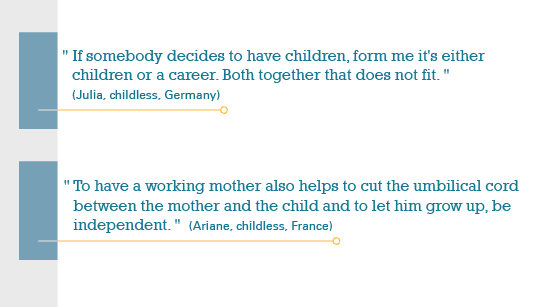"Children under the age of three are best looked after by their mothers". This conviction is still shared by most Germans, whereas in France external childcare is a fully accepted alternative, even for infants. This is one result of a comparative study by Anne Salles, Clémentine Rossier, and Sara Brachet that explores the long-term effects of family policies on fertility. Low fertility is a common feature in all European countries. The fertility rate is particularly low in German-speaking countries, whereas in the Nordic countries and in France birth rates are comparatively higher.
Looking more closely at the differences between France and Germany, most significant is the representation of mothers in the workforce: In France, 53.7% of mothers with at least one child under the age of 12 work fulltime, compared to just 36.1% in Germany. This figure reduces further to 10% when considering only mothers with at least one child under the age of three in western Germany.
Regarding support from the state, France and Germany allocate nearly the same percentage of their gross national products to families. Yet French family policies have encouraged the combination of work and motherhood since the 1980s, whereas Germany only recently began to invest in the general availability of external childcare, especially for children under the age of three.
The authors of this study wish to understand how these differences in family policies might have shaped attitudes towards childcare in both countries. To do so, they conducted semi-structured interviews with two comparable groups of middle-class individuals between 28 and 37 years of age in the mid-sized cities of Lübeck (in former West Germany; interview period 2004/05) and Poitiers (France; interview period 2006/07).

Figure 1 – Example quotations from interviews conducted in Lübeck, Germany, and Poitiers, France.
The striking finding of the study is that parents, and especially mothers, in the German sample are still expected to assume exclusive primary care duties for their children, as “non-parental” care is assumed to negatively affect childhood development. This attitude is shared by all of the respondents, whether they have children or not. Contrarily, quite the opposite attitude is predominant in the French sample. There fulltime childcare for children under the age of three in day care centres or by child minders is not only widely accepted, but also viewed positively.
Therefore it comes as no surprise that the economically active mother is widely accepted in France, while in western Germany the perception is still that women must withdraw at least partially from the labour force in order to be a “good mother”. Middle-class women especially may find this prospect too personally costly and thus prefer to remain childless.
The authors point out that these attitudes faithfully reflect the respective family policies in each country. Hence a change in family policies might result in changed attitudes towards working mothers in the future. This long-term effect could prove more important for an increase in fertility than the availability of childcare.
This volume has been published with financial support of the European Union in the framework of Population Europe.